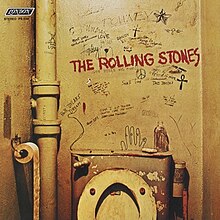Beggar's Banquet
| Beggars Banquet | ||||
|---|---|---|---|---|
 |
||||
| Studio album by The Rolling Stones | ||||
| Released | 6 December 1968 | |||
| Recorded | March - July 1968 | |||
| Studio | Olympic Studios, London and Sunset Sound, Los Angeles | |||
| Genre | ||||
| Length | 39:44 | |||
| Label |
Decca (UK) London (US) |
|||
| Producer | Jimmy Miller | |||
| The Rolling Stones chronology | ||||
|
||||
| Alternate cover | ||||

The originally planned "toilet" cover was rejected by both Decca and London in 1968. It was later featured on most Compact Disc reissues.
|
||||
| Singles from Beggars Banquet | ||||
|
||||
| Professional ratings | |
|---|---|
| Review scores | |
| Source | Rating |
| AllMusic | |
| Boston Herald | |
| Encyclopedia of Popular Music | |
| Entertainment Weekly | A |
| The Great Rock Discography | 10/10 |
| Music Story | |
| MusicHound Rock | 4.5/5 |
| NME | 8/10 |
| Rolling Stone | |
| The Rolling Stone Album Guide | |
Beggars Banquet is the seventh British and ninth American studio album by English rock band The Rolling Stones. It was released in December 1968 by Decca Records in the United Kingdom and London Records in the United States. The album was a return to roots rock for the band following the psychedelic pop of their 1967 album Their Satanic Majesties Request. It was the last Rolling Stones album to be released during Brian Jones' lifetime.
Glyn Johns, the album's recording engineer and longtime collaborator of the band, said that Beggars Banquet signaled "the Rolling Stones' coming of age ... I think that the material was far better than anything they'd ever done before. The whole mood of the record was far stronger to me musically." Producer Jimmy Miller described guitarist Keith Richards as "a real workhorse" while recording the album, mostly due to the infrequent presence of Brian Jones. When he did show up at the sessions, Jones behaved erratically due to his drug use and emotional problems. Miller said that Jones would "show up occasionally when he was in the mood to play, and he could never really be relied on:
When he would show up at a session—let's say he had just bought a sitar that day, he'd feel like playing it, so he'd look in his calendar to see if the Stones were in. Now he may have missed the previous four sessions. We'd be doing let's say, a blues thing. He'd walk in with a sitar, which was totally irrelevant to what we were doing, and want to play it. I used to try to accommodate him. I would isolate him, put him in a booth and not record him onto any track that we really needed. And the others, particularly Mick and Keith, would often say to me, 'Just tell him to piss off and get the hell out of here'.
Jones played sitar and tanpura on "Street Fighting Man",slide guitar on "No Expectations",harmonica on "Parachute Woman", "Dear Doctor" and "Prodigal Son", and Mellotron on "Jig-Saw Puzzle" and "Stray Cat Blues". Jones is sometimes mistakenly credited for playing the slide guitar on "Jig-Saw Puzzle"; both guitars are played by Keith Richards. The basic track of "Street Fighting Man" was recorded on an early Philips cassette deck at London's Olympic Sound Studios, where Richards played a Gibson Hummingbird acoustic guitar, and Charlie Watts played on an antique, portable practice drum kit. Richards and Mick Jagger were mistakenly credited as writers on "Prodigal Son", a cover of Robert Wilkins's Biblical blues song of the same name. According to Keith Richards the name Beggars Banquet "comes from a cat called Christopher Gibbs".
...
Wikipedia
